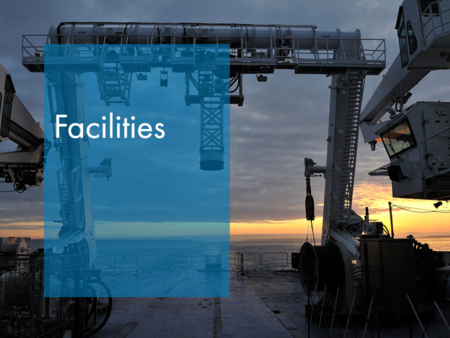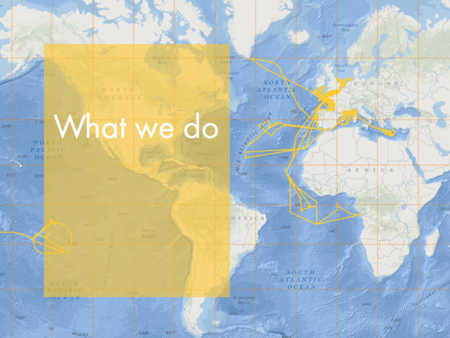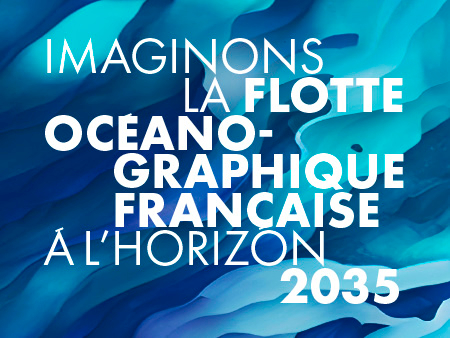Commissions for offshore vessels (CNFH)
Missions
The CNFH is in charge of assessing proposals for French scientific and technological research campaigns and training and teaching campaigns using offshore vessels and the so-called mid-shore vessels (Alis and Antea).
The CNFH is also in charge of assessing the results of the French oceanographic campaigns scheduled by the fleet's Very Large Research Infrastructure (TGIR). The CNFH assess the scientific value-added of campaigns, both in terms of achievement of the campaign goals themselves (in the short term, on return from the campaign), as well as in terms of the medium-term goals (the scientific value-added for subsequent laboratory work, evaluated retroactively, four or five years after the campaign). The commission also assess the value-added of the teaching campaigns in terms of number of involved students and teaching staff, educational outputs, generated work, and value produced by the work generated at sea.
The CNFH is kept up-to-date of problems occurring during the campaigns (weather-related incidents, or operational or technical issues) to be able to decide on requests for additional days, as relevant. Annually, the Fleet management informs the CNFH on the actions taken based on Fleet users’ feedback on cruise quality and the implemented corrective measures.
The CNFH provides advisory support for drafting calls for tenders for campaign projects proposed by the Fleet Management.
A campaign support fund offers additional funding to the funds raised by the scientific teams, for campaigns for which mobilization and/or demobilization take place outside mainland France. The CNFH is in charge of integrating the applications for support funds and submitting a proposal for the allocation of this support fund to the Fleet’s Steering Committee.
Functioning
The CNF committees meet in plenary session twice a year, according to the schedules set out in Annex 2. As such:
- The CNFH meets once in the fall to assess the proposals for marine campaigns and once in the spring, to assess the value of campaigns carried out four or five years earlier.
To ensure ongoing activity outside the plenary sessions, each committee has a Board, consisting of a chairman, two vice-chairmen, a secretary and representatives of various institutions. Additional committee members may be invited as necessary.
The Board maintains ongoing relations with the Scientific Council and the Fleet Management. It appoints the external experts who will assess the campaign proposals, as well as the rapporteurs and co-rapporteurs who will present the files at the plenary session.
The commission chairmen are permanent observers in the preparatory meetings of the FOF Steering Committee in an advisory capacity. Likewise, they are also permanent observers in an advisory capacity in Steering Committee meetings in debates on scheduling or subjects within their area of competence.
An interactive process between the CNF Board and the Fleet Management, including a formal meeting in the spring and in the fall, serves for communicating timetable developments (in the spring) and factoring the assessment results into the schedule (in the fall), before the final plan has been finalized by the fleet's Steering Committee.
Composition
- 23 deliberative members, each holding one vote. This includes the following appointed officials:
- Chairman
- Two vice-chairmen
- International full member
- Secretary.
- Several advisory members:
- A representative of each of the scientific directorates of the members of the fleet Steering Committee (IFREMER, CNRS, IRD and the French marine university network)
- A representative of the Fleet Management
- A representative of the National Agency for Research (ANR), if any campaign is part of a project already financed by the ANR.
- The chairman of the other CNF commission.
Each deliberative committee member has a designated alternate.
One or more technical observers on behalf of the Fleet Management and one observer on behalf of the National Oceanographic Instrumentation Center of the INSU, who primarily participate in the session in which the campaign proposals are assessed.
The CNFH is in charge of two types of evaluation:
- proposals for French scientific and technological research campaigns;
- scientific value-added of cruises 4 years after their raalisation.
Those evaluations are available in the reports of the CNFH.
Members of the CNFH
- Benoît Ildefonse, président (CNRS Montpellier) – Géosciences, Pétrologie, Pétrophysique, Tectonique
- Anne Godfroy, vice-présidente (Ifremer Brest) – Ecologie, Microbiologie
- Jérôme Aucan, vice-président (Ird Nouméa), Physique, Biogéochimie
- Nadine Rossignol, secrétaire (Ifremer Brest)
- Véréna Trenkel (Ifremer Nantes) – Biologie Systématique
- Daniela Zeppili (Ifremer Brest) – Biologie, Ecologie benthique
- Stéphane Hourdez (CNRS Banyuls) – Biologie Physiologie
- Ingrid Obernosterer (Observatoire Océanologique de Banyuls) – Microbial oceanography and microbial ecology
- Jean-François Ternon (IRD Sète) – Biogéochimie et réseaux trophiques
- Mireille Laigle (CNRS Géoazur, Nice) – Géophysique
- Maryline Moulin (Ifremer Brest) – Géodynamique, Géophysique, Tectonique
- Javier Escartin (IPGP Paris) – Géophysique, Géologie
- Valérie Ballu (CNRS La Rochelle) – Géodynamique
- Sébastien Zaragosi (Université Bordeaux) – Sédimentologie, Paléo climatologie
- Vincent Riboulot (Ifremer Brest) – Sédimentologie
- Valérie Chavagnac (CNRS Toulouse) – Pétro-géochimie
- Aline Govin (CNRS Gif-sur-Yvette) – Paléo-environnement
- Cécile Guieu (CNRS Villeranche-sur-mer) – Biogéochimie
- Eric Machu (IRD Brest) – Biogéochimie
- Xavier Durrieu de Madron (CNRS Perpignan) – Physique
- Andrea Doglioli (Université Marseille) – Physique
- Christophe Maes (IRD Brest) – Physique
- Guillaume Saint-Onge (ISMER Québec) - Géosciences




